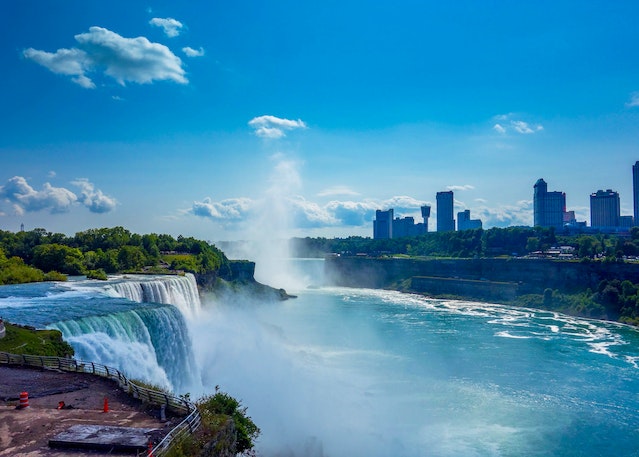
Niagara Falls is undoubtedly one of the world’s most famous natural wonders and a major tourism hub in Canada, drawing visitors from far and wide with its breathtaking beauty. However, despite its high popularity and the influx of tourists, the city has been grappling with a significant challenge for decades – the inability to attract significant investment and new tourism developments. This has led to a situation where tourists are lured by the name but are often left feeling underserved due to the lack of quality experiences. In a recent article, Niagara Falls was identified as one of the world’s biggest tourist traps, highlighting the urgent need for change and improvement in the city’s outdated tourism industry.
In 2019, the Government of Canada launched the Creating Middle Class Jobs: A Federal Tourism Growth Strategy to promote economic growth and job creation across all regions of the country. The strategy sets ambitious targets of $128 billion in tourism spending by 2025 and $180 billion by 2030, as well as attracting 25 million overnight international tourists to Canada by 2025 and 30 million by 2030. To achieve these goals, the government is taking a multifaceted approach, which includes improving Canada’s tourism infrastructure, developing new tourism products and experiences, enhancing accessibility and transportation, and promoting Canada’s unique tourism destinations to the world. The strategy also aims to create 180,000 new jobs in the Canadian tourism sector.
In the same year, 2019, the Ontario Lottery and Gaming Corporation (OLG) took a significant step in its efforts to promote Niagara Falls as a top-notch entertainment destination by selecting a new casino operator to manage the day-to-day operations of Niagara Fallsview Casino Resort and Casino Niagara. The OLG spoke person Tony Bitonti believed this new partnership would bring significant benefits to the region, including increased tourism and economic growth, and help to position Niagara as a premier entertainment destination.
However, the OLG has been reprimanded by Auditor General Bonnie Lysyk in its 2022 annual report, it has come under scrutiny after the audit revealed that its selection of the casino operator for the Niagara region, Mohegan Gaming & Entertainment Inc. (Mohegan), was based on flawed criteria. The audit revealed that OLG’s independent analyst concluded that Mohegan’s bid brought less economic and financial benefit to the province than if OLG had continued to operate the region. Hard Rock and Caesars, the other two bidders, proposed significantly more direct capital investment, with Hard Rock’s bid including approximately $857 million more than Mohegan, primarily focused on rebranding both casinos and adding a hotel to Casino Niagara. Caesars proposed approximately $140 million more than Mohegan for improvement.
Given the Auditor General’s findings, questions arise as to why the OLG ultimately chose Mohegan over Hard Rock and Caesars, both of whom offered significantly more direct capital investment and had more well-established casino brands internationally. The OLG’s decision has implications for the growth of Niagara Falls tourism, which could hinder the region’s ability to attract visitors and generate revenue. The audit also highlighted the lack of transparency in OLG’s procurement process and its failure to disclose its selection criteria to bidders. This has led to criticism that the process was biased towards Mohegan and that the selection criteria should have been more focused on the long-term economic benefits to the province.
Niagara Falls Mayor Jim Diodati recently spoke out after the announcement of the new Toronto Casino, stating that “there is too much cannibalism going on when it comes to gaming in Ontario.” He believes that it’s time to “grow the pie” instead of continuing to fight over the same slice of revenue. The current gaming model in Ontario sees the government owning the casinos, but outside companies operate them. This means that the outside operators are unlikely to invest major money in updating someone else’s building. In contrast, in places like Las Vegas, the operator owns the site, making it more advantageous for them to reinvest in and redevelop it and create more incentives for economic development.
Mayor Diodati argues that gaming is no longer the biggest reason people visit places like Las Vegas. Instead, they go for entertainment, dining, and other attractions. Niagara Falls is a unique destination to the country, and Mayor believes that gaming should be used to leverage tourism, investment, economic development, and employment, as was originally intended by the Ontario Lottery and Gaming Corporation.
Niagara Falls, as the face of Canadian tourism, is an example of the need for new and more competitive assets to attract more international tourists to the region. The Tourism Industry Association of Canada (TIAC) has also emphasized the importance of developing and promoting tourism assets in pre-budget 2023. In the submission to the Minister of Tourism and Associate Minister of Finance, the Honourable Randy Boissonault, for a new Federal Tourism Growth Strategy, to achieve Canada’s tourism spending, employment, and international competitiveness targets by 2030. TIAC has called for considerable investment from both public and private sources in asset development and upgrading, along with promoting and marketing existing assets. The report suggests that tens of billions of dollars in new capital would be required to fully achieve Canada’s asset goals by 2030.
Niagara Falls is a symbol of Canadian tourism and a major draw for visitors from all over the world. The current gaming model may not be sufficient to fully leverage economic development and revamp the city’s outdated tourism industry. With Canada set to host the next world cup, it’s time to consider adopting a fresh approach to gaming that could be a game-changer for the region and drive Canadian tourism to new heights. By exploring innovative models and strategies, Niagara Falls shall become a hub for world-class tourism assets, attracting significant investments and creating new opportunities for economic growth and global recognition. To achieve this, it’s crucial to break free from traditional thinking and embrace a new era of tourism that’s more dynamic, sustainable, and inclusive. The world is changing rapidly, and so should Niagara Falls to stay ahead of the curve and become a destination that truly represents the best of Canada.







